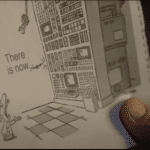I don’t know exactly where a conversation in class may go. Only old-fashioned professors who lecture with little room for question or discussion might claim to know precisely how a given time slot of 50 minutes or an hour and a quarter will unfold. Unpredictable conversations, I would argue, make more significant learning possible not only for students but the professor as well. Not that they are completely unforeseen (at least most of the time). The most interesting conversations and discoveries occur at the place where extensive preparation and familiarity with the known meets openness to the unknown.
Given that the class conversation I want to talk about was on the topic of artificial intelligence and personhood, mentioning this by way of introduction is especially relevant. AI can now mimic conversation with some modicum of success. But to what extent can it go in genuinely unexpected directions the way human conversations can?
This post has the title “Is Google Smarter Than Your Pet?“ That is a question I posed to my Religion and Science Fiction class recently. I didn’t anticipate doing so, even though I had planned for us to compare machines and animals and their respective intelligences and rights. The answers students gave to that question were pretty consistently “yes, in some ways; no, in others.” This raises the interesting question of when a machine might cross the threshold to the point where it might deserve some rights. Science fiction tends to fixate on when a machine might be considered a person deserving “human” rights. But there are limits to ways the law permits you to mistreat a dog or cat. Ants, on the other hand, you may stomp on to your heart’s desire. If it is just the capacity to experience suffering in particular ways that is the basis for the distinction, then we may be able to withhold that from our machine creations. However, we might also theoretically custom create human clones modified to lack that same capacity to experience suffering existentially. Why not do so and have an army of disposable soldiers, as in Star Wars: The Clone Wars?
I asked students which machines from fictional stories they know seem to them to be persons or close to it, and which seem to be merely emulating person-like behavior to provide a convenient interface for humans. I was glad that classics like Short Circuit and Transformers were brought up. I introduced KITT from Knight Rider into the discussion, briefly playing the opening credits sequence to show the car and recall the series.
That brings us to the amusing and/or instructive conclusion of this post. YouTube copyright blocked my unlisted video of the session, uploaded to be available to students who missed the class. A human person might have recognized that my brief use of that scene was within fair use for educational purposes. An animal would presumably not have grasped that there was an issue of possible copyright violation. But just as some dogs can be trained to sniff out drugs and explosives, YouTube has been trained to sniff out infringement of rights of ownership. Doesn’t this suggest that our software has entered the realm of animal intelligence if not surpassed it, and that its legal status might in at least some respects deserve to fall in the same realm?
My class explores a different and very timely question about AI in our next class meeting. I will share that in a separate post. In the meantime, here are some items of related interest:
A robot wrote this entire article. Are you scared yet, human?
How close are computers to automating mathematical reasoning?
How long until you fall in love with a robot?
Since I discuss animal intelligence in this post I should share this recent piece about a cat imitating human behavior (for what it can get out of doing so, obviously.)
The future of autonomous transportation
On creating a bit of software to emulate biological evolution:
http://theappleandthefinch.com/2016/05/22/finding-dawkins-weasels/
A brave new world to live and work in
https://www.thetechedvocate.org/10-awesome-ar-apps-for-the-classroom/
https://www.thetechedvocate.org/how-new-technology-can-boost-student-creativity-in-the-classroom/
Machine learning and hurricane prediction
Physics and Theories of Everything
Finally, here’s a video I came across recently related to a Star Trek episode that may have come to mind at one point as you were reading this post:
If you don’t know the episode from The Next Generation “The Measure of a Man” you should definitely watch it. Here is an excerpt from the trial in which Cmd. Data’s right to choose as a Starfleet officer, or status as a piece of Starfleet property, is the matter at stake:
https://www.youtube.com/watch?v=WjCytqku18M













